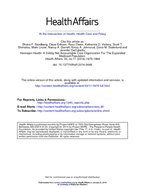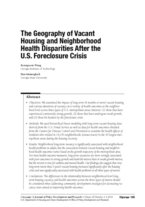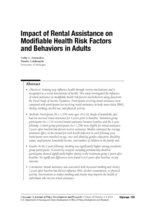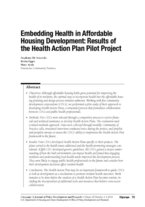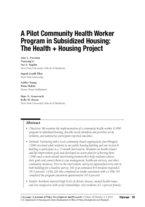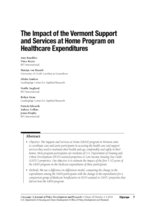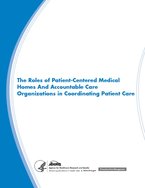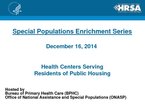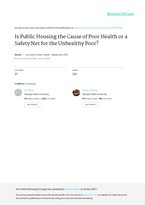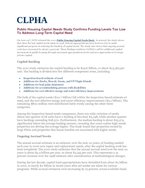0
Interactive
Community:
Aug 9, 2018
Mental health assessment
Authored by:
Topics: Health, Mental health
 Shared by Housing Is
Shared by Housing Is
Housing Is posted a
on Aug 9, 2018
0
Case study
Community:
Aug 9, 2018
Health care payment and delivery models that challenge providers to be accountable for outcomes have fueled interest in community-level partnerships that address the behavioral, social, and economic determinants of health.We describe how Hennepin Health—a county-based safety-net accountable care organization in Minnesota—has forged such a partnership to redesign the health care workforce and improve the coordination of the physical, behavioral, social, and economic dimensions of care for an expanded community of Medicaid beneficiaries.
Authored by:
Topics: Affordable Care Act, Cost effectiveness, Health, Low-income, Medicaid / Medicare, Mental health, Metrics, Partnerships, Research
 Shared by Housing Is
Shared by Housing Is
Housing Is posted a
on Aug 9, 2018
Health care payment and delivery models that challenge providers to be accountable for outcomes have fueled interest in community-level partnerships that address the behavioral, social, and economic determinants of health.We describe how Hennepin Health—a county-based safety-net accountable care org
0
Report
Community:
Aug 9, 2018
Beginning in 2014, with the support of the Kresge Foundation, SAHF engaged its members in efforts to build collaborative relationships with partners from the healthcare sector, in order to implement joint initiatives to demonstrate the contributions of service-enriched housing to the healthcare system. Although many of our members have established work with healthcare stakeholders, few have direct partnerships with insurers. Subsequently, this endeavor focused on collaboration with Medicaid payers. In partnership with Health Management Associates (HMA), target markets and potential Medicaid health plan partners were identified and paired with SAHF members to facilitate conversation and identify points of synergy.
Authored by:
Topics: Health, Housing, Low-income, Partnerships
 Shared by Housing Is
Shared by Housing Is
Housing Is posted a
on Aug 9, 2018
Beginning in 2014, with the support of the Kresge Foundation, SAHF engaged its members in efforts to build collaborative relationships with partners from the healthcare sector, in order to implement joint initiatives to demonstrate the contributions of service-enriched housing to the healthcare syst
0
Policy Brief
Community:
Aug 9, 2018
Federal rules on immigrant youth and families are changing rapidly, from Deferred Action for Childhood Arrivals (DACA) to Temporary Protected Status (TPS). This brief provides basic information about eligibility for education services, and practical suggestions for schools.
Authored by: ScoolHouse Connection
Topics: Child welfare, Education, Immigrants, Legislation & Policy
 Shared by Housing Is
Shared by Housing Is
Housing Is posted a
on Aug 9, 2018
Federal rules on immigrant youth and families are changing rapidly, from Deferred Action for Childhood Arrivals (DACA) to Temporary Protected Status (TPS). This brief provides basic information about eligibility for education services, and practical suggestions for schools.
0
Policy Brief
Community:
Aug 9, 2018
The Every Student Succeeds Act of 2015 (ESSA) amended the McKinney-Vento Act’s Education for Homeless Children and Youth program, as well as Title I, Part A of the Elementary and Secondary Education Act. The ESSA amendments include many provisions designed to improve training, identification, enrollment, stability, and
success, from pre-school through high school, and the transition to post-secondary education. A brief summary is provided.
Authored by: SchoolHouse Connection
Topics: Early childhood, Education, Homelessness, Legislation & Policy
 Shared by Housing Is
Shared by Housing Is
Housing Is posted a
on Aug 9, 2018
The Every Student Succeeds Act of 2015 (ESSA) amended the McKinney-Vento Act’s Education for Homeless Children and Youth program, as well as Title I, Part A of the Elementary and Secondary Education Act.
0
Publication
Community:
Aug 9, 2018
This short document provides basic information to help housing and homeless assistance providers advocate with their families and youth for appropriate educational services, from birth through higher education. The rights and protections outlined here apply to all children and youth experiencing homelessness, as defined by the education subtitle of the McKinney-Vento Act.
Authored by: SchoolHouse Connection
Topics: Child welfare, Early childhood, Education, Homelessness, Legislation & Policy, Low-income, School-readiness
 Shared by Housing Is
Shared by Housing Is
Housing Is posted a
on Aug 9, 2018
This short document provides basic information to help housing and homeless assistance providers advocate with their families and youth for appropriate educational services, from birth through higher education.
0
Report
Community:
Aug 1, 2018
Through the hard work of communities around the country, we now have proof of something that we didn’t before—that ending homelessness is achievable. Home, Together builds upon what we have learned from states and communities over time, and lays out the strategies we know we must advance at the federal level in order to support and accelerate state and local progress.
Authored by: United States Interagency Council on Homelessness
Topics: Cost effectiveness, Data sharing, Disabilities, Dual-generation, Homelessness, Housing, Legislation & Policy, Low-income, Mental health, Partnerships, Preventative care, Racial inequalities, Stability, Substance abuse, Supportive housing
 Shared by Housing Is
Shared by Housing Is
Housing Is posted a
on Aug 7, 2018
United States Interagency Council on Homelessness
Through the hard work of communities around the country, we now have proof of something that we didn’t before—that ending homelessness is achievable.
1
Research
Community:
Aug 1, 2018
We examined the impact of long-term (6 months or more) vacant housing and various durations of vacancy on a variety of health outcomes at the neighborhood level across three types of U.S. metropolitan areas (metros): (1) those that have experienced consistently strong growth, (2) those that have undergone weak growth, and (3) those hit hardest by the foreclosure crisis
Authored by:
Topics: Asset building, Asthma, Community development, Health, Housing, Low-income, Mental health, Metrics, Research, Safety, Transportation
 Shared by Housing Is
Shared by Housing Is
Housing Is posted a
on Aug 1, 2018
We examined the impact of long-term (6 months or more) vacant housing and various durations of vacancy on a variety of health outcomes at the neighborhood level across three types of U.S.
0
Research
Community:
Aug 1, 2018
Housing may influence health through various mechanisms and is
recognized as a social determinant of health. This study investigated the influence of rental assistance on modifiable health risk factors and behaviors using data from the Panel Study of Income Dynamics. Participants receiving rental assistance were compared with participants not receiving rental assistance on body mass index (BMI), obesity, smoking, alcohol use, and physical activity
Authored by:
Topics: Exercise, Health, Housing, Low-income, Metrics, Nutrition, Obesity, Partnerships, Racial inequalities, Research, Smoke-free, Substance abuse
 Shared by Housing Is
Shared by Housing Is
Housing Is posted a
on Aug 1, 2018
Housing may influence health through various mechanisms and is
recognized as a social determinant of health. This study investigated the influence of rental assistance on modifiable health risk factors and behaviors using data from the Panel Study of Income Dynamics.
0
Research
Community:
Aug 1, 2018
Homelessness among children is correlated with developmental delays, fair or poor health, and high healthcare utilization. Associations of homelessness specifically among infants younger than 12 months, however, are unknown. This study evaluates homelessness during infancy as a risk for adverse infant and maternal health and hardship.
Authored by:
Topics: Child welfare, Depression, Disabilities, Dual-generation, Early childhood, Education, Family engagement, Food insecurity, Grade-level proficiency, Health, Homelessness, Housing, Low-income, Metrics, Partnerships, Pre-natal, Research, School-readiness, Youth
 Shared by Housing Is
Shared by Housing Is
Housing Is posted a
on Aug 1, 2018
Homelessness among children is correlated with developmental delays, fair or poor health, and high healthcare utilization. Associations of homelessness specifically among infants younger than 12 months, however, are unknown.
0
Research
Community:
Aug 1, 2018
This study draws on qualitative interview data to examine transitions into rent-assisted housing as they relate to diabetes self-management behaviors.
Authored by:
Topics: East Coast, Health, Homelessness, Housing, Low-income, Mental health, Metrics, Nutrition, Research, Stability
 Shared by Housing Is
Shared by Housing Is
Housing Is posted a
on Aug 1, 2018
This study draws on qualitative interview data to examine transitions into rent-assisted housing as they relate to diabetes self-management behaviors.
0
Research
Community:
Aug 1, 2018
Although affordable housing holds great potential for improving the
health of its residents, the optimal way to incorporate health into the affordable housing planning and design process remains unknown. Working with five community development corporations (CDCs), we performed a pilot study of their approach to developing Health Action Plans, a structured process that formalizes collaboration
between CDCs and public health professionals.
Authored by:
Topics: Depression, Green, Health, Housing, Low-income, Partnerships, Research
 Shared by Housing Is
Shared by Housing Is
Housing Is posted a
on Aug 1, 2018
Although affordable housing holds great potential for improving the
health of its residents, the optimal way to incorporate health into the affordable housing planning and design process remains unknown.
0
Research
Community:
Aug 1, 2018
We sought to learn more about how state- and locally funded rental
assistance programs were created, how they are structured, whom they serve, and how they are funded.
Authored by:
Topics: Cost effectiveness, Data sharing, Disabilities, Family engagement, Funding, Health, Homelessness, Housing, Legislation & Policy, Low-income, Partnerships, Research, Supportive housing
 Shared by Housing Is
Shared by Housing Is
Housing Is posted a
on Aug 1, 2018
We sought to learn more about how state- and locally funded rental
assistance programs were created, how they are structured, whom they serve, and how they are funded.
0
Research
Community:
Aug 1, 2018
Work requirements in public housing are highly controversial, and
little is known about their impacts. We examined how implementation of a work requirement paired with supportive services by Charlotte Housing Authority has impacted residents’ overall well-being. Although the policy might improve well-being
by increasing household income, it might also engender stress through greater housing precarity.
Authored by:
Topics: Depression, Disabilities, Education, Food insecurity, Health, Housing, Low-income, Medicaid / Medicare, Mental health, Metrics, MTW, Partnerships, Racial inequalities, Research, South, Workforce development
 Shared by Housing Is
Shared by Housing Is
Housing Is posted a
on Aug 1, 2018
Work requirements in public housing are highly controversial, and
little is known about their impacts. We examined how implementation of a work requirement paired with supportive services by Charlotte Housing Authority has impacted residents’ overall well-being.
0
Research
Community:
Aug 1, 2018
We examine the implementation of a community health worker (CHW)
program in subsidized housing, describe needs identified and priorities set by residents, and summarize participant-reported outcomes.
Authored by:
Topics: East Coast, Health, Housing, Low-income, Mental health, Metrics, Partnerships, Place-based, Racial inequalities, Research
 Shared by Housing Is
Shared by Housing Is
Housing Is posted a
on Aug 1, 2018
We examine the implementation of a community health worker (CHW)
program in subsidized housing, describe needs identified and priorities set by residents, and summarize participant-reported outcomes.
0
Research
Community:
Aug 1, 2018
The Support and Services at Home (SASH) program in Vermont aims
to coordinate care and assist participants in accessing the health care and support services they need to maintain their health and age comfortably and safely in their homes. Most program participants are residents of U.S. Department of Housing and Urban Development (HUD)-assisted properties or Low-Income Housing Tax Credit
(LIHTC) properties. Our objective is to estimate the impact of the first 5 1/2 years of the SASH program on the Medicare expenditures of these participants.
Authored by:
Topics: Cost effectiveness, Dual-eligibles, East Coast, Health, Home visiting, Housing, Legislation & Policy, Low-income, Medicaid / Medicare, Metrics, Seniors
 Shared by Housing Is
Shared by Housing Is
Housing Is posted a
on Aug 1, 2018
The Support and Services at Home (SASH) program in Vermont aims
to coordinate care and assist participants in accessing the health care and support services they need to maintain their health and age comfortably and safely in their homes. Most program participants are residents of U.S.
0
Report
Community:
Jul 27, 2018
This report aims to provide the Robert Wood Johnson Foundation (RWJF) and other health foundations with a perspective on the emerging intersection of social determinants of health (SDOH), health care systems, and social and other services. These fields intersect in how and what data are collected, and in ways the data are used to improve health and well-being and promote a Culture of Health.
Authored by:
Topics: Data sharing, Funding, Health, Medicaid / Medicare, Metrics, Nutrition, Partnerships, Place-based, Research
 Shared by Housing Is
Shared by Housing Is
Housing Is posted a
on Jul 27, 2018
This report aims to provide the Robert Wood Johnson Foundation (RWJF) and other health foundations with a perspective on the emerging intersection of social determinants of health (SDOH), health care systems, and social and other services.
0
Policy Brief
Community:
Jul 27, 2018
The effective coordination of a patient’s health care services is a key component of high quality and efficient care. In this brief we first describe the goals of care coordination and the central role for primary care, followed by the specific activities involved in care coordination. Next we summarize the evidence on the effectiveness of different care coordination activities that PCMHs and ACOs can pursue. Finally, we suggest roles for PCMHs and ACOs in coordinating care and summarize key points.
Authored by:
Topics: Data sharing, Health, Partnerships, Preventative care
 Shared by Housing Is
Shared by Housing Is
Housing Is posted a
on Jul 27, 2018
The effective coordination of a patient’s health care services is a key component of high quality and efficient care. In this brief we first describe the goals of care coordination and the central role for primary care, followed by the specific activities involved in care coordination.
0
Publication
Community:
Jul 27, 2018
Anthem’s affiliated health plans and other managed care organizations (MCOs) increasingly are helping Medicaid members who are diagnosed with mental health conditions and substance use disorders (MH/SUD) find stable housing, secure meaningful employment, and address a range of financial and daily life challenges.
Authored by:
Topics: Affordable Care Act, Cost effectiveness, Depression, Funding, Health, Housing, Medicaid / Medicare, Mental health, Nutrition, Substance abuse, Supportive housing, Workforce development
 Shared by Housing Is
Shared by Housing Is
Housing Is posted a
on Jul 27, 2018
Anthem’s affiliated health plans and other managed care organizations (MCOs) increasingly are helping Medicaid members who are diagnosed with mental health conditions and substance use disorders (MH/SUD) find stable housing, secure meaningful employment, and address a range of financial and daily li
0
Publication
Community:
Jul 27, 2018
Authored by:
Topics: Asthma, East Coast, Health, Healthy homes, Housing, Low-income, Partnerships, Supportive housing
 Shared by Housing Is
Shared by Housing Is
Housing Is posted a
on Jul 27, 2018
0
Publication
Community:
Jul 27, 2018
For fiscal year 2013, the Department requests $2.07 billion for the Public Housing Capital Fund to address development, rehabilitation, modernization and preservation needs of the Public Housing portfolio. While funding the Capital Fund at the requested level of $195 million over the fiscal year 2012 appropriation will not enable PHAs to meet all existing capital and accrual needs for fiscal year 2013, funding at this level will provide PHAs with some ability to prevent their housing stock from falling into a state of obsolescence, disrepair, and/or removal from inventory.
Authored by:
Topics: Funding, Green, Legislation & Policy, MTW, Sustainability
 Shared by Housing Is
Shared by Housing Is
Housing Is posted a
on Jul 27, 2018
For fiscal year 2013, the Department requests $2.07 billion for the Public Housing Capital Fund to address development, rehabilitation, modernization and preservation needs of the Public Housing portfolio.
0
Research
Community:
Jul 27, 2018
This review discusses how attitudes toward affordable housing are likely shaped by factors that influence other social policy attitudes— particularly ideology and stereotyping. The author concludes with recommendations and methods that planners can use to manage public opposition and influence attitudes toward affordable housing.
Authored by:
Topics: Housing, Legislation & Policy, Low-income, Racial inequalities, Research
 Shared by Housing Is
Shared by Housing Is
Housing Is posted a
on Jul 27, 2018
This review discusses how attitudes toward affordable housing are likely shaped by factors that influence other social policy attitudes— particularly ideology and stereotyping.
0
Research
Community:
Jul 27, 2018
The purpose of this paper is to investigate the association between public housing and health conditions: specifically, we ask if residents entered public housing already ill or if public housing may cause the poor health of its residents.
Authored by:
Topics: Health, Housing, Low-income, Mental health, Metrics, Mobility, Nutrition, Racial inequalities, Research, South
 Shared by Housing Is
Shared by Housing Is
Housing Is posted a
on Jul 27, 2018
The purpose of this paper is to investigate the association between public housing and health conditions: specifically, we ask if residents entered public housing already ill or if public housing may cause the poor health of its residents.
0
Report
Community:
Jul 27, 2018
On June 24th, HUD released the 2010 Public Housing Capital Needs Study. In general, the study shows that since the last capital needs study in 1998, federal appropriations have been too low to make significant progress at reducing the backlog of capital needs. The study also shows that ongoing accrual costs have increased by about 15 percent. These findings reinforce CLPHA’s call for additional capital investment in public housing through increased appropriations levels and new approaches to leverage private capital.
Authored by:
Topics: Cost effectiveness, Disabilities, Energy, Funding, Lead, RAD, Research
 Shared by Housing Is
Shared by Housing Is
Housing Is posted a
on Jul 27, 2018
On June 24th, HUD released the 2010 Public Housing Capital Needs Study. In general, the study shows that since the last capital needs study in 1998, federal appropriations have been too low to make significant progress at reducing the backlog of capital needs.
0
Publication
Community:
Jul 27, 2018
On January 1, 2014, in states that have chosen to expand Medicaid eligibility under the Affordable Care Act, nearly all chronically homeless people who lacked health insurance became eligible for Medicaid. This Primer offers state Medicaid officials and other interested parties strategies for using Medicaid to meet the needs of this very vulnerable population--some strategies that have succeeded in the past and some that are emerging under provisions of the Affordable Care Act.
Authored by:
Topics: Affordable Care Act, Criminal justice, Disabilities, Dual-eligibles, Funding, Health, Homelessness, Housing, Low-income, Medicaid / Medicare, Mental health, Partnerships, Stability, Substance abuse, Supportive housing
 Shared by Housing Is
Shared by Housing Is
Housing Is posted a
on Jul 27, 2018
On January 1, 2014, in states that have chosen to expand Medicaid eligibility under the Affordable Care Act, nearly all chronically homeless people who lacked health insurance became eligible for Medicaid.
 Shared by Housing Is
on Aug 9, 2018
Shared by Housing Is
on Aug 9, 2018
 Shared by Housing Is
on Aug 9, 2018
Shared by Housing Is
on Aug 9, 2018
 Shared by Housing Is
on Aug 9, 2018
Shared by Housing Is
on Aug 9, 2018
 Shared by Housing Is
on Aug 9, 2018
Shared by Housing Is
on Aug 9, 2018
 Shared by Housing Is
on Aug 9, 2018
Shared by Housing Is
on Aug 9, 2018
 Shared by Housing Is
on Aug 9, 2018
Shared by Housing Is
on Aug 9, 2018

 Shared by Housing Is
on Aug 7, 2018
Shared by Housing Is
on Aug 7, 2018

 Shared by Housing Is
on Aug 1, 2018
Shared by Housing Is
on Aug 1, 2018
 Shared by Housing Is
on Aug 1, 2018
Shared by Housing Is
on Aug 1, 2018
 Shared by Housing Is
on Aug 1, 2018
Shared by Housing Is
on Aug 1, 2018
 Shared by Housing Is
on Aug 1, 2018
Shared by Housing Is
on Aug 1, 2018
 Shared by Housing Is
on Aug 1, 2018
Shared by Housing Is
on Aug 1, 2018
 Shared by Housing Is
on Aug 1, 2018
Shared by Housing Is
on Aug 1, 2018
 Shared by Housing Is
on Aug 1, 2018
Shared by Housing Is
on Aug 1, 2018
 Shared by Housing Is
on Aug 1, 2018
Shared by Housing Is
on Aug 1, 2018
 Shared by Housing Is
on Aug 1, 2018
Shared by Housing Is
on Aug 1, 2018
 Shared by Housing Is
on Jul 27, 2018
Shared by Housing Is
on Jul 27, 2018
 Shared by Housing Is
on Jul 27, 2018
Shared by Housing Is
on Jul 27, 2018
 Shared by Housing Is
on Jul 27, 2018
Shared by Housing Is
on Jul 27, 2018
 Shared by Housing Is
on Jul 27, 2018
Shared by Housing Is
on Jul 27, 2018
 Shared by Housing Is
on Jul 27, 2018
Shared by Housing Is
on Jul 27, 2018
 Shared by Housing Is
on Jul 27, 2018
Shared by Housing Is
on Jul 27, 2018
 Shared by Housing Is
on Jul 27, 2018
Shared by Housing Is
on Jul 27, 2018
 Shared by Housing Is
on Jul 27, 2018
Shared by Housing Is
on Jul 27, 2018
 Shared by Housing Is
on Jul 27, 2018
Shared by Housing Is
on Jul 27, 2018





